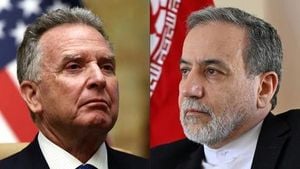On May 6, 2025, a significant discussion emerged regarding the responsibilities of celebrities in advertising, particularly in Vietnam. This conversation was sparked by recent controversies surrounding false advertising claims made by various artists and public figures. The Ministry of Culture, Sports and Tourism (VH-TT-DL) is currently working on amendments to the Advertising Law, aiming to tighten regulations for celebrities involved in advertising.
NSND Xuân Bắc, the Director of the Department of Performing Arts at VH-TT-DL, emphasized that all individuals, including artists and celebrities, must adhere to legal standards when engaging in advertising. He stated, "Anyone who misrepresents facts in advertising must be held accountable before the law." According to Decree 38/2021/ND-CP, which outlines penalties for administrative violations in cultural and advertising sectors, those who commit fraud or misrepresent products face serious legal consequences.
Mr. Lê Quang Tự Do, the Director of the Department of Radio, Television and Electronic Information, pointed out a troubling trend: many artists lack a fundamental understanding of the legal implications of their advertising activities. He noted that some celebrities engage in advertising without verifying the accuracy of the products they promote, leading to unintentional legal violations. For instance, he cited the case of Quang Linh Vlog, who, despite his positive contributions to the community, demonstrated a lack of legal knowledge.
Moreover, Mr. Tự Do highlighted the tendency among some artists to creatively alter advertising scripts, resulting in exaggerated claims. He provided an example where a product advertised as "supporting height increase" was misrepresented by an artist as "increasing height by 5 to 10 cm." Such embellishments can mislead consumers and are becoming increasingly common in the industry.
The case of Kera candy serves as a notable example of this issue, where advertisements claimed that each piece of candy was equivalent to consuming one kilogram or even five kilograms of vegetables. Such outrageous claims not only mislead consumers but also undermine trust in advertising as a whole.
In addition to misrepresentation, celebrities often project their personal experiences onto the products they endorse, assuming that their positive results will be universal. This can lead to misleading statements that violate advertising regulations, particularly when influential figures promote products without substantiated evidence.
PGS Bùi Hoài Sơn, a delegate from the National Assembly's Committee for Culture and Society, shared similar concerns, stating that celebrities play a crucial role in shaping consumer behavior and societal values. He warned that when public figures promote dubious products or spread misinformation, it not only harms consumers but can also erode cultural and ethical standards over time.
In light of these issues, BTV Quang Minh and MC Vân Hugo were recently fined over 105 million VND for their involvement in false advertising. This case highlights the ongoing struggle to hold celebrities accountable for their actions in the advertising space.
To address these challenges, the VH-TT-DL and the Ministry of Information and Communications have previously issued a Code of Conduct for artists and celebrities in online spaces. However, this code lacks legal enforceability, which has hindered its effectiveness in curbing violations. A representative from the VH-TT-DL acknowledged that while apologies are important, they are insufficient in addressing the problem. He stated, "Those who violate the law must correct their mistakes, compensate affected parties, and comply with legal penalties to prevent recurrence."
As part of a broader strategy, the VH-TT-DL plans to introduce stricter regulations that will limit the public visibility of artists who violate advertising standards. This initiative aims to serve as a deterrent against future infractions and will be part of the draft amendments to the Advertising Law, which are set to be presented to the National Assembly later this month.
PGS Bùi Hoài Sơn reiterated that imposing strict penalties on celebrities for advertising violations is not intended to stifle creativity or freedom of expression. Instead, it aims to clarify the responsibilities that come with influence. He remarked, "Celebrities must understand that their actions and words serve as a model for society—either as an inspiration or as a cause for deviation from accepted values." The goal is to remind the public that art should be closely linked to ethics, and influence should be accompanied by accountability.
Experts have noted that social media platforms have transformed into vast stages where celebrities can significantly influence consumer behavior and cultural trends with a single post or video. As these platforms operate outside traditional censorship frameworks, the importance of ethical responsibility and transparency in public statements has never been more crucial.
The ongoing discussions and proposed regulatory changes reflect a growing recognition of the need for accountability in advertising, especially concerning the role of celebrities. As the draft amendments to the Advertising Law move forward, the hope is that they will foster a more responsible advertising environment that protects consumers while allowing artists to express their creativity within ethical boundaries.





